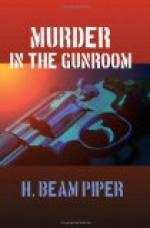Gladys set down her glass. “So!” she said. “Things begin to explain themselves!”
“You may say so, indeed,” Rand told her. “And what do you suppose Rivers did with this little item of information? Why, as nearly as I can reconstruct it, he did a very foolish thing. He tried to blackmail a man who had committed a murder. He told Fred Dunmore he’d keep his mouth shut about the .36 Colt, if Dunmore would get him the Fleming collection. He wanted that instead of cash, because he could get more out of it, in a few years, than Dunmore could ever scrape, and in the meantime, the prestige of handling that collection would go a long way toward repairing his rather dilapidated reputation. Fred should have bumped him off, right then; it would have been the cheapest and easiest way out, and he’d probably be alive and uncaught today if he had. But he was willing to pay ten thousand dollars to save himself the trouble, and that’s what he told you Rivers had offered for the collection. The ten thousand Dunmore told you Rivers was willing to pay was really the ten thousand he was willing to pay, himself, to keep Rivers quiet.
“Then I was introduced into the picture, and, as you know, one of my first acts was to go to Rivers’s shop and sneer scornfully at Rivers’s supposed offer of ten thousand. And, right away, Rivers upped it to twenty-five thousand. You’ll recall, no doubt, that Mr. Fleming had a life-insurance policy, one of these partnership mutual policies, which gave both Dunmore and Varcek exactly twenty-five thousand apiece. I assume that Rivers had found out about that.
“I thought, at the time, that it was peculiar that Rivers would jump his own offer up, without knowing what anybody else was offering for the collection. I see, now, that it wasn’t his own money he was being so generous with. And there was another incident, while I was at Rivers’s shop, that piqued my curiosity. Rivers had in his shop a .36 Leech & Rigdon revolver, and I had been informed that it was a revolver of that type that Mr. Fleming had brought home the evening he was killed. I thought at the time that it was curious that two Confederate arms of the same type and make should show up this far north, but my main idea in buying it was the possibility that I might use it, in some way as circumstances would permit, to throw a scare into somebody. Rivers was quite willing to let me have it until he found out that I would be staying at this house, and then he tried to back out of the sale and offered me seventy-five dollars’ credit on anything else in the shop, if I’d return it to him. Well, I’d known that Mr. Fleming had been about to start suit against Rivers over a crooked deal Rivers had put over on him, and I knew that if Mr. Fleming’s death had been murder, there had been a substitution of revolvers. So I showed the gun I’d bought from Rivers to Philip Cabot, who had seen the revolver Mr. Fleming had bought, and he recognized it. It hasn’t been established just how Rivers got the Leech & Rigdon, and never will be; the only people who knew were Rivers and Dunmore, and both are in the proverbial class of non-talebearers. I assume that Dunmore gave it to Rivers as a sort of down payment on Rivers’s silence, and to get rid of it.




